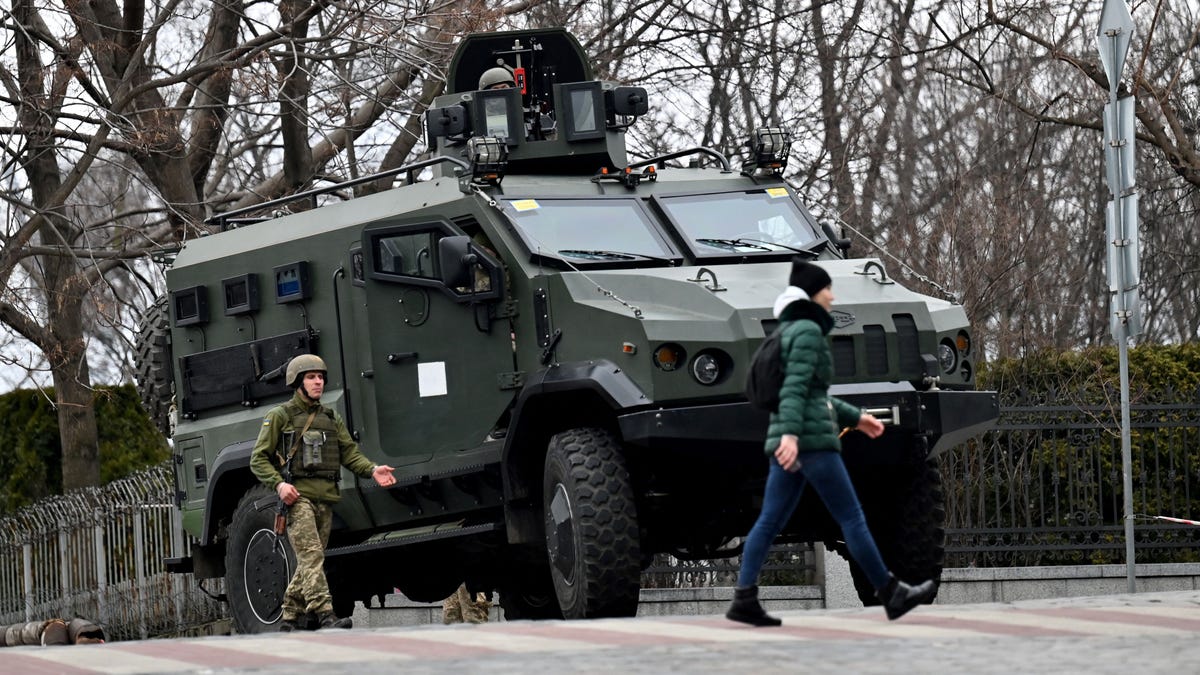Big Tech's Support for Ukraine Recasts Industry's Global Role

A Ukrainian military vehicle in Kyiv. Big Tech companies have become active players in the conflict as they provide aid to Ukrainians and place restrictions on Russian state media.
What's happening
Tech companies are aiding Ukrainians, blocking Russian state-run media and monitoring for cyberattacks after Moscow invaded its neighbor.
Why it matters
The industry is more actively involved than corporations have been in past military conflicts.
Big Tech has responded to Russia's invasion of Ukraine by offering assistance to Ukrainians, stymieing Russia's disinformation campaigns and shuttering the services Moscow's military can use on the ground, moves that make the industry a de facto participant in the hostilities.
At the request of the Ukrainian government, rocket company SpaceX activated satellite internet service in Ukraine through its Starlink system, a move that keeps the country connected to the web even as Russia attacks its websites. AirBnb has offered free housing to Ukrainians fleeing the fighting, and US phone carriers have waived fees to customers who need to call Ukraine.
Big social networks, including Facebook-owner Meta, Twitter and Google-owned YouTube face familiar questions about dealing with disinformation and propaganda. All three have placed restrictions on Russian state-run media's access to ad platforms and continue to fact-check posts deemed false. Microsoft and Google have limited downloads of Russian state-run media services from their app stores.
Separately, Microsoft has worked with US and Ukrainian government officials to warn of hacking threats. After consulting with the Ukrainian government, Google disabled a feature that displays traffic conditions in its widely used Maps app, a move that could potentially make navigating more difficult for the Russian military. Apple ceased sales of its products in Russia following an appeal from Kyiv, which asked the consumer electronics giant to block Russians from accessing its app store because "modern technology is perhaps the best answer to the tanks, multiple rocket launchers (hrad) and missiles."
The actions taken by the Big Tech companies indicate a changing level of involvement for corporations caught in global conflict. While industry has always had a role in war efforts -- private sector enterprises build tanks, aircraft and weapons, and sometimes pivot to help militaries during crises -- companies weren't often involved in battlefield actions. Now businesses are actors in the conflict.
"They're in essence firing a shot," said Matthew Schmidt, a professor of national security at the University of New Haven. "That's very different."
Big Tech isn't alone in taking action to support Ukraine and strike back at Russia. BP and Shell said they would cut ties with two gas companies controlled by the Russian government, Rosneft and Gazprom. A Norwegian asset management firm said it would divest from Russian businesses. Even the public media union that produces Eurovision banned Russia from its singing contest this year.
Not every call for help has found support from the tech sector. Cryptocurrency exchanges Binance and Coinbase, for example, have reportedly said they won't unilaterally freeze funds held by Russians because doing so would be contrary to the foundational principles of the blockchain-based finance system.
Patreon, a fundraising website, suspended a campaign to raise money for Ukrainian military training because it violated policies against "funding weapons or military activity."
Still, tech companies are stepping up in ways unseen in the past.
On Thursday, Microsoft noticed signs of an attack aimed at Ukrainian digital infrastructure. Brad Smith, the software giant's president, said in a blog post the company flagged malicious software used in the attack and advised Ukrainian officials on how to defend against it.
Microsoft has also limited access to RT and other Russian state-run media from its MSN start page. It also pushed results from the news sites down in search results on Bing.
"It's important to note that we are a company and not a government or a country," Smith wrote, noting the company is working alongside Ukraine, the US, the EU, the NATO alliance and the UN.
Tech companies have long struggled to respond to misinformation and disinformation during elections and protests. State-sanctioned violence, like the genocide of the Rohingya Muslims in Myanmar, has presented even more difficult decisions for companies responding to the the way their platforms are used.
Jennifer Grygiel, an associate professor at Syracuse University who studies social media and foreign policy, says the high-profile nature of the war between Ukraine and Russia brings even more scrutiny to corporate policies. Tech companies host state-run media around the world, making their decisions to boost or deemphasize content crucial.
Facebook, YouTube and other companies are also in the position of deciding which government's content can be monetized through ads, a common practice on social media. In other cases, social media companies label some official content as disinformation, decisions that can anger those governments.
The decisions can make relationships among the companies and the countries in which they operate testy. But the companies may have no choice but to take action.
Meta did just that on Monday.
The huge social media company said it would ban RT and Sputnik, two of Russia's most important external-facing media arms across the European Union, at the request of some governments. Nick Clegg, a former UK deputy prime minister who oversees global affairs at Meta, said the company was taking the step because of the "exceptional nature of the current situation."
The move followed a call by European Commission President Ursula von der Leyen over the weekend for the 27-country bloc to ban Russia's state media because of its "toxic and harmful disinformation."
"We've hit a point now where what Russia has done is so bad that it's calling attention to the abuse of propaganda on these platforms," Grygiel said.

